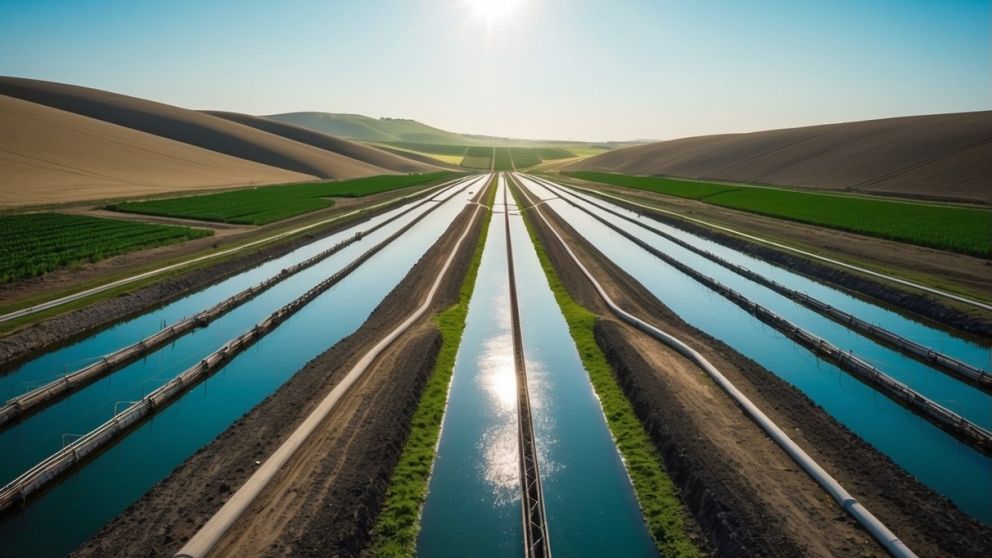How to Evaluate Farmland for Auction: Key Factors for Long-Term Agricultural Success

Buying farmland at auction can be exciting for farmers and investors alike. It's a chance to acquire valuable agricultural property that could yield long-term profits.
But how do you know if the land you're eyeing is worth the investment?
To evaluate farmland for auction, consider factors like soil quality, water access, topography, climate, infrastructure, and market potential.
[A vast expanse of fertile farmland with rolling hills, lush green crops, and a clear blue sky overhead, surrounded by a border of trees and a winding river]
These elements play crucial roles in determining a property's long-term agricultural success.
By carefully assessing each aspect, you can decide whether a particular piece of land is right for your farming goals.
Evaluating farmland requires attention to detail and research. It's important to look beyond surface-level appearances and examine the property's characteristics.
This approach helps ensure that the land you're considering at auction aligns with your agricultural plans and financial objectives.
Key Takeaways
- Soil quality, water access, and climate compatibility are essential to evaluate farmland.
- Infrastructure and market potential significantly impact a property's long-term agricultural success.
- Careful assessment of farmland characteristics helps buyers make informed decisions at land auctions.
Soil Quality: The Foundation of Agricultural Success
Soil quality plays a crucial role in determining farmland productivity and value. It affects crop yields, farm profitability, and long-term sustainability.
High-quality soil is essential for optimal crop growth and yields. It provides vital nutrients, water retention, and a stable root environment.
Soil quality directly impacts agricultural productivity. Better soil leads to higher crop yields and more consistent harvests over time.
Good soil supports plant health by:
Supplying essential nutrients
Retaining moisture
Allowing proper root development
Promoting beneficial microbial activity
Poor soil quality can stunt plant growth, reduce yields, and increase susceptibility to pests and diseases. This ultimately affects farm profitability and land value.
How to Evaluate Soil Quality Before an Auction
Assessing soil quality is crucial when considering farmland for auction. Several key factors should be examined:
- Soil types and ratings: Identify the dominant soil types and their agricultural suitability ratings.
- Soil fertility: Test nutrient levels, pH, and organic matter content.
- Drainage: Evaluate natural drainage patterns and any existing tile drainage systems.
- Historical yield information: Review past crop performance data to gauge productivity potential.
- Tillable acres: Determine the amount of land suitable for cultivation.
Soil testing provides valuable insights into soil health and potential limitations. Professional soil analysis can reveal nutrient deficiencies, pH imbalances, or other issues affecting crop growth.
Meanwhile, examining historical yield data helps estimate the land's productive capacity. This information, combined with soil quality assessments, aids in determining the farmland's true value and potential for long-term agricultural success.
Water Access and Irrigation Potential: Securing Your Farm's Lifeblood
Water is crucial for any farm's success. Good water access and irrigation systems can make or break agricultural operations.
The Importance of Water Access for Farming Operations
Water management in agriculture is vital for sustainable food production. Reliable water access allows farmers to grow crops even in dry periods, helping increase yields and produce quality.
Irrigation extends growing seasons and enables diverse crop choices. Farms with good water access are more resilient to drought. They can maintain consistent production levels year-round.
Water rights are a valuable asset for farmland. They can significantly increase property value, and secure water access reducing risks and operating costs for farmers.
How to Assess Water Availability and Irrigation Systems
Buyers should check water sources carefully when evaluating farmland. Look for on-site wells, access to rivers, or canal water rights. Verify water quality and quantity through testing.
Examine existing irrigation infrastructure. Modern, efficient systems add value to the property. Check pumps, pipes, and sprinklers for condition and capacity.
Research local water regulations and natural resource district rules. These affect water usage rights and the potential for future expansion.
Consider implementing water-saving techniques like drip irrigation or precision sprinklers. These can stretch limited water resources further.
Finally, assess drought risk in the area. Properties with multiple water sources offer more security.
Land Topography: How Terrain Impacts Farming
Terrain shapes farm productivity and operations. Evaluating topography is key for smart land purchases and long-term success.
Understanding the Role of Topography in Farming
Topography affects many aspects of agriculture. It impacts water flow, erosion, and crop suitability.
For example, hilly land drains faster but may erode more. Meanwhile, flat areas can hold water longer but might flood.
Slopes affect the amount of sunlight crops receive. South-facing slopes in the northern hemisphere receive more sun, which affects plant growth and harvest times.
Terrain also impacts farm tasks. Steep slopes make it hard to use big machines. Flat land is easier to work but may need extra drainage.
What to Look for When Evaluating Topography
When checking farmland, look at elevation, slope, and aspect. Use tools like Google Earth for aerial views. These show the land's shape and features.
Check how water moves on the land. Look for:
- Natural drainage paths
- Low spots that might flood
- Steep areas prone to erosion
Count usable acres. Steep slopes may only work for pasture. Flat areas are often best for crops.
Look at neighboring land, too. Nearby hills can block the sun or affect water flow. Understanding the whole area helps predict farm challenges and opportunities.
Need expert advice on what to look for in auctioned farmland? Connect with Underwood Land Company's specialists for insights on soil quality, water access, and more. Schedule Your Consultation now to ensure your investment flourishes.
Climate Compatibility: Will the Weather Work for You?
Climate plays a crucial role in agricultural success. It affects crop selection, growing seasons, and potential yields. Evaluating local climate conditions is essential for long-term farming viability.
Understanding Local Climate and Its Effect on Agriculture
Climate shapes what crops can thrive in an area. Temperature, rainfall, and frost dates determine suitable plant varieties and growing seasons.
For example, corn needs warm summers, while wheat can handle cooler temps.
Extreme weather poses risks. Droughts, floods, and severe storms can damage crops and reduce yields. Due to global warming, some areas face increasing climate challenges.
Agricultural land suitability analysis helps match crops to climate conditions. This process considers factors like:
- Average temperatures
- Precipitation levels
- Growing season length
- Frost-free days
Farmers must adapt practices to local conditions. This may include irrigation, frost protection, or choosing heat-tolerant crop varieties.
How to Research Local Climate Conditions
Gathering climate data is key for informed farmland decisions. Here are steps to research an area's climate:
- Check USDA plant hardiness zones
- Review historical weather data from nearby stations
- Study local frost dates and growing season length
- Examine precipitation patterns and drought history
Talk to local farmers and agricultural extension offices. They offer valuable insights on climate trends and challenges.
Online resources provide detailed climate information. The National Weather Service offers historical data and long-term forecasts.
Consider future climate projections, too. Some regions may face significant changes in the coming decades, affecting crop viability and water availability.
Infrastructure and Access: Ensuring Efficiency and Connectivity
Good infrastructure and access are crucial for farm success. They impact daily operations, productivity, and long-term profitability.
Why Infrastructure is Key to Farm Efficiency
Farm infrastructure plays a vital role in agricultural productivity. Efficient infrastructure improves agricultural output and sustainability. Proper fencing is essential for livestock management and crop protection.
It helps control grazing patterns and prevents wildlife intrusion. Outbuildings store equipment, supplies, and harvested crops and protect valuable assets from weather damage and theft.
Power units, such as electricity access, are critical for modern farming operations. They enable the use of machinery, irrigation systems, and technology-driven farming practices.
Cross-fencing divides larger pastures into smaller sections. This allows for rotational grazing, which improves pasture health and livestock management.
How to Evaluate Farm Infrastructure and Accessibility
When assessing farmland for auction, buyers should carefully examine existing infrastructure and access points.
Road access is crucial for transporting goods and equipment. Buyers should check the condition of roads leading to and within the property.
Transportation infrastructure connects rural areas to markets. Good connectivity can reduce transportation costs and improve market access.
Water infrastructure, including irrigation systems and water sources, is vital for crop production. Buyers should evaluate water availability and quality.
Buyers should also assess the condition of existing buildings and fences. This helps estimate potential repair or replacement costs.
Land management options, such as conservation easements or zoning restrictions, may impact future development possibilities. Buyers should research these factors before bidding.
Market and Zoning Considerations: Can You Do What You Want with the Land?
Zoning and land use regulations set rules for how farmland can be used. They control things like:
- Types of crops allowed
- Livestock operations
- Building sizes and locations
- Water use
Farmers should check with the local county assessor about these rules. Some areas have strict limits on farm activities, while others are more open to different uses.
Zoning can affect property taxes and land value. Knowing if the land is zoned for agriculture can often mean lower taxes.
Evaluating Proximity to Markets and Agricultural Buyers
Location matters for farm profits. Being close to markets can mean:
- Lower transport costs
- Fresher products
- More buyers
Farmers should look at nearby agricultural buyers. These might include:
- Grain elevators
- Livestock auctions
- Food processors
Local experts can give info on price trends and cash rental rates. They know what crops do well in the area.
Online tools can help compare land prices. Look at sales of similar farms nearby. This shows if the auction price is fair.
Turn insights into action with the Underwood Land Company app. Access detailed farmland evaluations, receive auction alerts, and more, all on your mobile device. Download Our App and empower your agricultural investment decisions with the right tools.
Future Potential: Thinking Long-Term for Agricultural Success
Evaluating farmland for auction requires considering various factors. Buyers must consider soil quality, water access, and location, which impact crop yield and long-term value.
Evaluating the Growth and Development Potential of the Land
When investing, buyers should examine farmland's growth potential, zoning laws, and nearby development plans. These factors can affect future land use and value.
Check for mineral rights. If valuable resources exist underground, these can provide extra income. Easements are also important. They may limit land use but can offer benefits like conservation payments.
Consider the land's adaptability to new crops or farming methods. This flexibility can increase its long-term value. Assess the potential for infrastructure improvements like irrigation systems or storage facilities.
Sustainability and Conservation: Preserving the Land's Health
Long-term success in agriculture depends on maintaining soil health. Implementing crop rotation and cover cropping can help with this. These practices can boost yields and reduce input costs over time.
Water management is also crucial. Invest in efficient irrigation systems and water conservation techniques to ensure sustainable water use and protect against drought.
Consider adopting precision agriculture technologies. These can optimize resource use and increase productivity. Examples include GPS-guided machinery and soil sensors.
Explore organic farming potential, too. The demand for organic products is growing, which could provide a premium price for crops and increase land value.
Conclusion
Evaluating farmland for auction requires careful consideration of many factors. Buyers must consider soil quality, water access, and location, which impact crop yield and long-term value.
Market trends and local economic conditions also play a key role. Due to local factors, farmland prices can vary greatly between regions.
Successful bidders often conduct thorough research before the auction. This includes reviewing property history and assessing potential improvements.
Renting to skilled farmers can help maintain land value over time. Good tenants care for the property and generate steady income.
A balanced approach weighing all these factors leads to informed bidding decisions. With careful evaluation, farmland auctions can offer valuable investment opportunities for long-term agricultural success.
Secure your future in agriculture with the right farmland investment. Discover how Underwood Land Company can guide you in choosing properties with high agricultural potential. Explore Our Listings and start your journey toward successful farmland ownership today!
Frequently Asked Questions
What are the primary factors that affect the valuation of farmland?
Land quality and location are crucial in farmland valuation. Soil fertility, irrigation capabilities, and crop production history impact value.
The condition and age of the property's buildings also affect pricing. Access to markets and transportation routes can increase land worth.
How do you calculate the market value of agricultural land?
Market value is often calculated using comparable sales data. This method looks at recent sales of similar properties in the area.
Another approach is the income method, which estimates value based on the land's potential to generate income from crops or livestock.
How have farmland prices changed in recent years?
Farmland prices have generally trended upward in recent years. Low interest rates and high commodity prices have contributed to this increase.
Regional variations exist, with some areas seeing more significant price jumps than others.
What variables should be considered when assessing the long-term investment potential of farmland?
Farmland's long-term investment potential depends on several factors, including soil quality, water availability, and climate trends.
Crop production history and potential for future yield improvements are also important. Local economic conditions and development potential can affect long-term value.
What is the significance of location in determining the value of farmland by state?
Location greatly influences farmland value. States with fertile soil, favorable climate, and good infrastructure tend to have higher land prices.
Proximity to urban areas can increase value due to potential development opportunities. States with strong agricultural economies often see higher farmland prices.
How can tax benefits influence the overall valuation of agricultural land?
Tax benefits can make farmland more attractive to buyers. Many states offer property tax breaks for land used in agriculture.
Federal tax incentives for conservation easements can also affect land value. These benefits may allow owners to deduct a portion of the land's value from their taxes.



